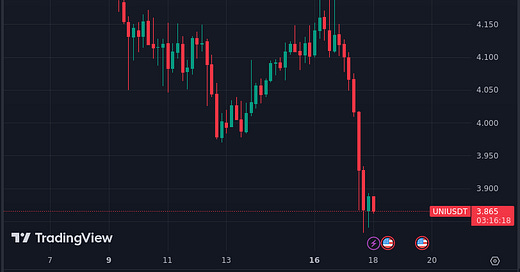Welcome Avatar!
Yesterday, Uniswap announced that they would be introducing a 0.15% (that’s 15 bps for our fihnance readers) fee for certain transactions placed through its front-end.
Here’s why that’s interesting.
First of all, these fees do not get paid to tokenholders. The Uniswap “fee switch” requires governance approval, whereas this fee apparently does not.
The fees are paid to Uniswap Labs, the operating entity behind the Uniswap protocol. 15 pennies from every $100 will be paid to Uniswap Labs. Only a specific set of tokens like ETH, USDC, WETH, USDT, DAI, and a few others have this fee when you swap them on Uniswap. If you're just swapping one type of stablecoin for another, you won't have to pay this fee. Also, if you're just changing ETH to WETH (a wrapped version of ETH), you won't be charged either.
Autist note: we recommended our paid subscribers use DEX aggregators - in addition to avoiding this new fee, you get “best execution” and can avoid MEV attacks on your trade
UNI is down 7% in the 24h following the announcement, bringing its LTM performance to -40% and trading at the lowest price since 2020.

There’this situation in full. Some of you may be familiar with it already. Let’s travel back in time to just over 3 years ago to September 2020.
Around the time of the UNI token launch, other decentralized exchanges and DeFi protocols were introducing their own governance tokens, often with liquidity mining programs. Some of these protocols directly forked Uniswap's code and added a token to attract liquidity. The most notable example was SushiSwap, which posed a competitive threat by forking Uniswap and introducing the SUSHI token as a reward for staking Uniswap’s LP tokens and then migrating them to Sushiswap.
Launching UNI was partly a response to these competitive pressures. It’s certainly possible that Uniswap never wanted to decentralize governance or cede control to tokenholders, but felt they had to create the token to respond to competitive threats back in 2020. The result of this has been a dual “ownership” structure where Uniswap Labs equity is held by a small group of people and the token is widely available to all. The Uniswap team received only 21% of the UNI token, whereas they likely hold most of the Labs equity.
There is a laundry list of reasons as to why tokenholders and equityholders are at odds. We would highly suggest reading our article What Your Tokens Really Mean in full. Here are some of the concerns:
A crypto venture might have a treasury, token market cap, operating entity's equity value, and a variety of social and legal obligations. This makes it challenging to determine how value is distributed among stakeholders.
It can be unclear whether a treasury belongs to the corporate entity or the token holders. This can lead to disputes and confusion about who has rights to the funds in the treasury, and the rights to decide how those funds are used.
Token holders might assume they have certain rights, such as access to transparent financials, making demands of the team, or influencing the project's direction. However, these rights might not be explicitly granted in any documentation, leading to conflicts.
Tokens might enable collaboration without the need for traditional incorporation, but when disputes arise, the lack of clear legal obligations becomes a problem. It's often unclear what token holders are legally entitled to, especially when compared to equity holders.
The principal-agent problem, where one party (the agent) makes decisions on behalf of another (the principal), is exacerbated in the crypto space. Token holders (principals) might be at a disadvantage compared to developers or the organization (agents) due to a lack of transparency, absence of regulation, and a technical knowledge gap.
Tokens might be seen as assets by investors, but from the issuer's perspective, they could be viewed as liabilities. This duality can lead to confusion about what a token truly represents and its implications for both the protocol and its stakeholders.
Equity holders might prioritize the long-term success and profitability of the company, while token holders might be more focused on short-term gains and token value appreciation. These differing priorities can lead to conflicts in decision-making and strategy.
Crypto ventures often operate based on "social contracts" or community trust. However, in situations with bad actors or disputes, these social contracts might not hold up, especially when compared to traditional legal contracts that bind equity holders.
Token holders might face the risk of being left with valueless tokens if the team behind the protocol acts in bad faith, a phenomenon known as "rugging." Equity holders, on the other hand, have more traditional legal protections.
In traditional companies, it's clear that equity holders are the last to get paid. However, in crypto ventures with both tokens and equity, the priority of payment becomes muddled, especially when considering "social contracts."
In summary, Uniswap Labs, Uniswap protocol, and the UNI token might seem like they are the same at the surface level, but when you take a closer look you realize they have different goals and incentives. In fact, there are far more conflicting goals than you think.
Let’s start with the big one — monetization and revenue generation.
Uniswap Labs is a centralized entity, and may seek ways to monetize the platform or generate revenue through proprietary features, licensing, partnerships, or capital raises at the entity level. When “Uniswap” acquired NFT aggregator Genie, it was actually Uniswap Labs not Uniswap the protocol or UNI the token holders.
Uniswap Labs has earned $11,962 so far from the new fee, which went live earlier today.
Conversely, the Uniswap protocol community and token holders would likely prioritize keeping the platform as open and permissionless as possible. Token holders want fees to stream to them, not Uniswap Labs.
Even Uniswap’s licensing and IP is a point of controversy. Uniswap Labs wants to protect its code and features to prevent malicious forks and maintain a competitive edge. The broader community on the other hand advocates for a fully open-source approach, allowing anyone to fork, modify, or build upon the protocol without restrictions.
Were governance to become more decentralized, token holders could push for decisions that benefit them directly, even if they diverge from the original vision or what might be best for the protocol's long-term health. Being a diverse group with varying interests, token holders might have different opinions on the direction the protocol should take, influenced by their short-term gains, ideological beliefs, or other factors. On the flipside, a team with a significant influence over the protocol's direction will likely favor decisions that align with their own vision or business interests.
To make it abundantly clear: there is no clean setup that lets everyone get what they want in the dual equity + token structure.
As the operating entity of the Uniswap Protocol, the onus should be on Uniswap Labs to demonstrate that they are good faith actors that work to the benefit of the protocol and UNI tokenholders. Otherwise, there is no justification for holding the UNI token.
Uniswap has now introduced an “interface fee” that is exclusively to the benefit of Uniswap Labs, not the protocol. Now, you could argue that providing capital to the operating entity will indirectly benefit the protocol by covering their operating expenses (though we have no idea what these expenses are). Uniswap Labs raised $165 million in October 2022, and it’s likely that the team has been looking at ways to continue to fund the operations without having to sell additional equity.
A more cynical view would be that the UNI token, of which the team was allocated a “mere” ~21%, may have already been monetized by the team. The team likely owns the lion’s share of the Uniswap Labs equity, and is looking for ways to increase the equity value. What better way to increase equity value than cash flows?
Perhaps the real answer is: all the above!
It’s clear that fees solve a series of issues for Uniswap Labs, while solving no problems for UNI token holders.
This is not the first time equityholders have benefited to the detriment of tokenholders.
We’ve spoken about dYdX’s old tokenomics many times. Users would receive token incentives for trading on the platform, thereby encouraging excessive trading activity. Meanwhile, the trading fees would be paid to the dYdX operating entity. The reasoning given for that setup was “regulations.” Perhaps Uniswap will point to the same reasoning. We don’t buy it, of course. Regulations being a hurdle in compensating token holders does not justify taking actions that benefit the equity at the expense of token holders.
Still, tokenholders don’t have any real rights they can exercise to defend themselves. Tokens continue to be backed by social obligations (the threat of holders selling) rather than any real legal obligations. If the team does not care about the token and is compensated primarily through other ways (i.e. the equity), don’t expect the social obligations to protect you.
Token designs can be complex or obscure. Our paid subscribers can access our database of deep dives on DeFi protocols where we explain token value accrual in depth, so investors can distinguish between synergistic and predatory token models.
Until next time, anon…
Disclaimer: None of this is to be deemed legal or financial advice of any kind. These are opinions from an anonymous group of cartoon animals with Wall Street and Software backgrounds.
We now have a full course on crypto that will get you up to speed (Click Here)
Security: Our official views on how to store Crypto correctly (Click Here)




Great article. I find the part of increasing their own equity value at the expense of tokenholders particularly sinister...
So what exactly is the point of holding the UNI token besides speculation on price and I guess some governance features? Seems like its fairly useless.